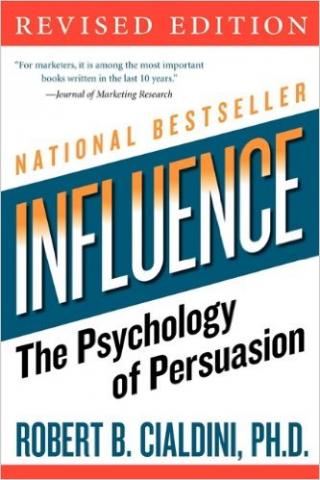The Best Book I've Ever Read is "Influence: The Psychology of Persuasion"
Sep 19,2015
It's frustrating losing arguments and negotiations, especially when it's for something you really want. No one goes out of their way to help you become a better negotiator when you're a child. From your parents to the education system virtually everyone has a vested interest in keeping you from being a great negotiator.
This book changed my life! That's such a cliché thing to say, but this book actually did. "Influence, the classic book on persuasion, explains the psychology of why people say "yes"—and how to apply these understandings," as the Amazon description says. Understanding why people say "yes" to certain things explains how to get people to agree with your decisions-- everything from where to eat dinner tonight, to why your interviewer should give you your dream job.
In this article I will go over the six main principles of influence, and explain how they make a real-life difference in a sometimes fun and entertaining way.
1. Reciprocity
People tend to return a favor.
This social norm rule states that if someone does you a favor, you should pay them that favor back. Sometimes if you want something from someone it's best to just "pay it forward." The other individual will then feel that they owe you and more likely to give you what you need when you need it. Reciprocity is a real-world tried & tested strategy. When you go shopping at a supermarket or Costco, for example, you are often presented with stands of free samples. After having one or two free samples, and becoming friends with the lovely attendant, you start to feel a little obligated to look into buying the product. Obligated. After a free sample? Social norms are so deeply embedded, and studies show that people actually do feel obligated to return a favor.
This plays into friendships too. If a friend pays for your lunch, you feel obligated to buy them lunch next time ("But I owe you John"). Sometimes those same social strings can be utilized in other ways...

2. Consistency
If people commit, orally or in writing, to an idea or goal, they are more likely to honor that commitment.
Once we have made a choice or taken a stand, we will encounter personal and interpersonal pressures to behave consistently with that commitment. Those pressures will cause us to respond in ways that justify our earlier decision.
Making public commitments pressures people to conform with their commitments. This influences why many couples stay married, even though divorce may be a better option. This type of "forced accountability" can be used to achieve goals too. If you tell everyone you know that you are planning to run a marathon in 3 months, you will be more obligated to do it because you don't want to endlessly tell people that you didn't actually do it months later.
3. Social Proof
People will do things that they see other people are doing.
Social proof is what a lot of us would refer to as peer pressure, but in many ways it’s closer to herd behavior. This rule applies especially to the way we decide what constitutes correct behavior. We view a behavior as more correct in a given situation to the degree that we see others performing it. Basically, everyone else is doing it, so I’ll do it too.

4. Authority
People will tend to obey authority figures, even if they are asked to perform objectionable acts.
Simply put, people tend to follow authority figures. We are taught from a very young age that obedience to authority is right and disobedience is wrong. This is where the adage "Fake it until you make it" comes into play in a meaingful way. Because people respond to authority so readily, it's actually a self-fulfilling prophecy where the people who act like they have authority actually do end up getting the authority.

5. Liking
People are easily persuaded by other people that they like.
We prefer to say yes to the requests of people we know and like. Some of the factors that affect "likeability" include; physical attractiveness, similarity, compliments, familiarity, cooperation, and associations to other things. An innocent association with either good or bad things will influence how people feel about us. Being a member of HonorSociety.org, for example, may be an indicator to others that you care about achievement, that you are goal-oriented and you are a leader. Positive associations in themselves have tremendous value in how people perceive you and others.
6. Scarcity
Perceived scarcity will generate demand.
Opportunities seem more valuable to us when their availability is limited. Fans of behavioral economists can see how this ties into the concept of Loss Aversion – the fear of loss is always greater than the desire for gain. Why does the Scarcity principle work so effectively? We believe that the things that are difficult to possess are typically better than those that are easy to possess, so we often use an item’s availability to help us quickly decide on its quality. Rather than weighing all the pros and cons, we use scarcity as a mental shortcut to make decisions.
Final Thoughts
Some of these you may have intrinsically known, other parts may be entirely new to you. This article is meant to highlight the main principles of influence with real-world examples. If you want to understand more of the science and psychology behind choices, I highly recommend you pick up a copy of “Influence: The Psychology of Persuasion.”
Regardless, with this influence framework you are now equipped with a framework to systemically understand why people say "yes" and get others to say yes to you. Just remember- to whom much is given, much is expected.
Questions? Comments? I'd be happy to answer in the comments section below.






